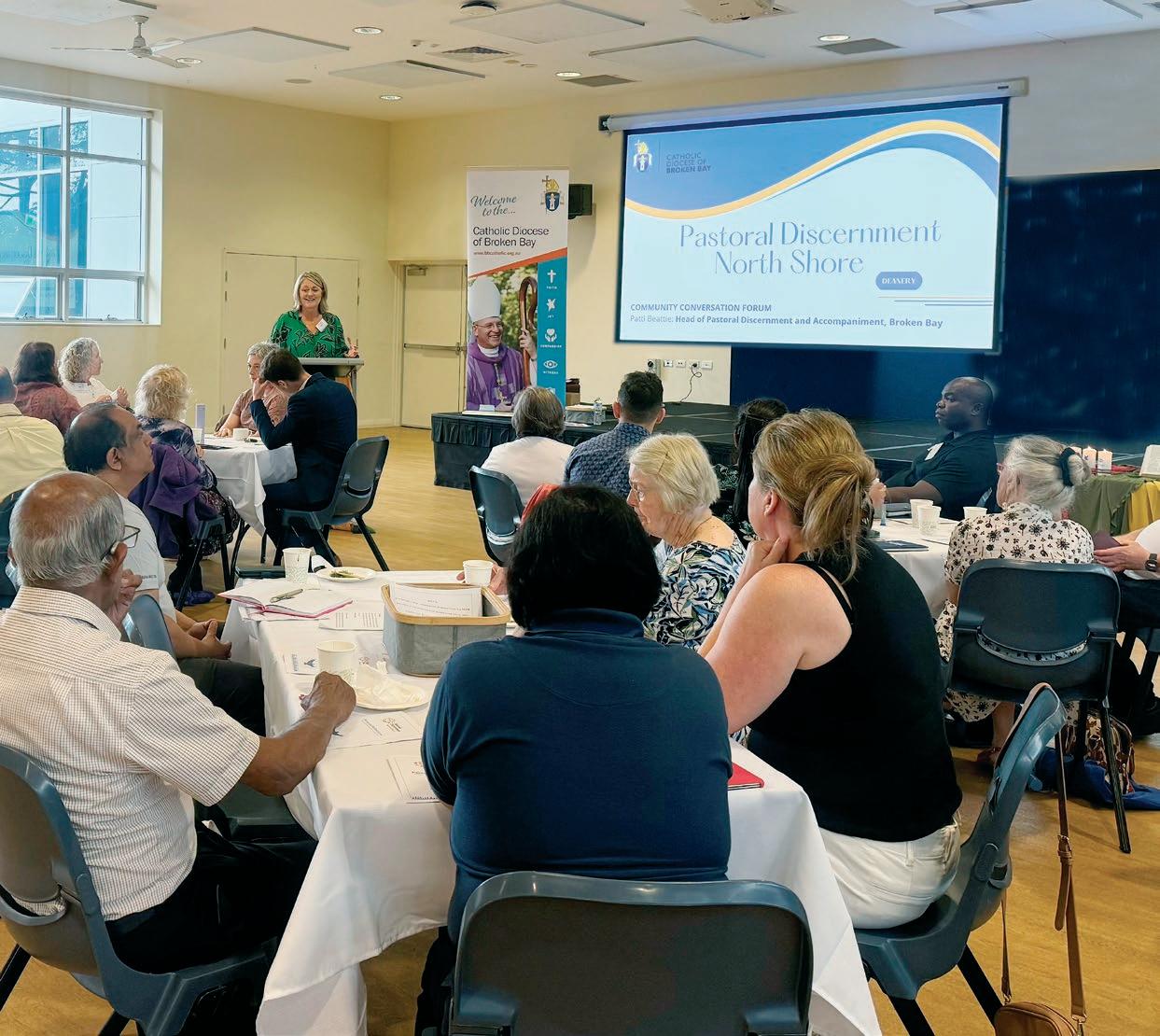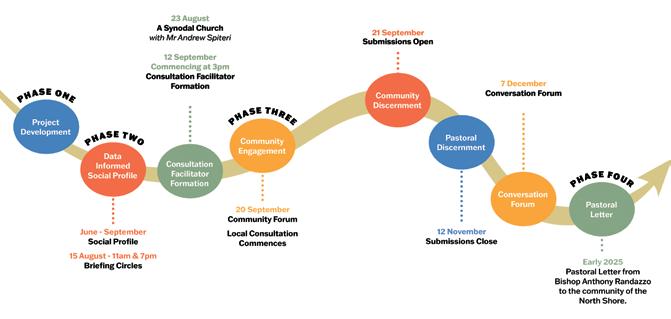


“Wisdom is radiant and unfading, and she is easily discerned by those who love her, and is found by those who seek her.”
WISDOM 6:12




“Wisdom is radiant and unfading, and she is easily discerned by those who love her, and is found by those who seek her.”
WISDOM 6:12
In July 2024, Bishop Anthony invited the faithful of the North Shore Deanery to take part in a pastoral discernment project designed to strengthen the community’s sense of mission in Christ. Grounded in the conviction that the Holy Spirit continually guides the journey and that, by baptism, every person shares responsibility for its life and growth, this initiative calls the whole community into active participation.
The project seeks to open new opportunities for the people of the North Shore Deanery to engage more fully in the mission of Jesus Christ. It embodies a synodal way of discerning together how best to proclaim the Gospel, especially in light of the distinctive circumstances and needs of the North Shore.
The data-driven social profile report of the North Shore revealed several key insights that shaped the consultation and community engagement phase of the project. These insights highlighted; A significant decline in participation in the pastoral and sacramental life across the North Shore Deanery. Increasing demand and stress resulting from high living costs and housing challenges faced by the People of God in the North Shore. Potential pastoral synergies within the Deanery, along with key issues affecting residents in the region. The need to consider the current configurations of Catholic communities on the North Shore, and how these configurations may either facilitate or limit mission, ministry, worship, liturgy, and catechesis.
The consultation process engaged a broad spectrum of voices, including children and young adults, through the many Consultation Forums held across parishes, schools, and CatholicCare service areas. Communities were invited to prayerfully reflect on five guiding Consultation Questions using the Conversation in the Spirit methodology. The Community Engagement Phase took place from mid-September to early December 2024, during which a total of seventy
one submissions were received. More than 1,700 people from the North Shore participated, engaging through both online and in-person gatherings, including Briefing Circles, the Community Forum, and the Conversation Forum.
The following synthesis presents key insights gathered from the feedback of the People of God on the North Shore during the Community Engagement Phase of the Project. A more detailed analysis can be found in the Summary Report.
Respondents expressed deep concern about declining participation in the Church’s pastoral and sacramental life, linking it to broader societal trends such as secularisation, competing family priorities, and weakened parish connections, with particular impact on Catholic identity, Mass attendance, and youth engagement. Many highlighted the vital role of Catholic schools as a primary point of contact for families, calling for stronger school–parish partnerships, greater affordability, and renewed investment in social justice initiatives and community-building efforts that extend beyond traditional parish life. There was a strong call for the Church to uphold its core teachings while also responding to contemporary realities—through greater inclusivity, renewed pastoral practices, digital engagement, and strengthened support for clergy leadership—so as to foster belonging and rekindle faith across generations.
The consultation process highlighted strong opportunities for pastoral synergies within the North Shore Deanery, emphasising collaboration, resource sharing, and community engagement, with particular focus on strengthening connections between parishes, schools, and families. Suggestions ranged from joint youth programs, family retreats, and shared training resources to centralised ministry formation and improved communication platforms,
while also noting challenges such as limited resourcing, geographical barriers, and the need for Diocesan support. A recurring theme was the need to balance common initiatives with the distinct identity of each parish, ensuring that collaboration strengthens rather than overshadows local traditions, while building a more cohesive and inclusive Catholic community.
The voices gathered highlighted the rising cost of living, mental health challenges, and social isolation as significant pressures affecting families, youth, and the elderly in the North Shore Deanery, limiting their ability to fully engage in parish life. Responders called for practical support – including financial counselling, mental health services, disability inclusion initiatives, and communitybuilding programs to foster stronger connections, compassion, and accessibility. Throughout the consultation, responders emphasised the need for more dynamic youth engagement, greater cultural inclusivity, and stronger intergenerational ties, ensuring the Church responds to contemporary challenges while nurturing a welcoming and vibrant Catholic community.
There was an emphasis on the Church’s potential to adapt its pastoral mission to address pressing socioeconomic challenges on the North Shore, including high living costs, housing stress, mental health struggles, and issues such as homelessness and domestic violence. Respondents highlighted the importance of practical initiatives—such as affordable housing, community gardens, financial counselling, and partnerships with CatholicCare, St Vincent de Paul, and local councils—while calling for greater coordination, stronger community connections, and a more inclusive approach. Overall, participants urged the Church to move beyond a solely Mass-centric focus by strengthening social justice outreach, reviewing structures and resources, and fostering innovative, collaborative programs that meet the real needs of families and individuals.
Respondents highlighted fragmentation among parishes and low engagement, particularly among youth and families, as key challenges to fostering a unified Catholic identity, calling for strengthened community connections, inclusive practices, and collaborative initiatives across parishes, schools, and ministries. Suggestions included family-centered faith formation, modernised Mass experiences, vibrant youth programs, expanded lay leadership, digital engagement, and shared resources, while emphasising the need to balance centralised initiatives with the preservation of parish identity and traditions. Participants also stressed the importance of Diocesan leadership, improved communication, and coordinated formation opportunities to create a cohesive, welcoming, and culturally inclusive Catholic community across the North Shore Deanery.
Mrs Patti Beattie, Head of Pastoral Discernment and Accompaniment for the Diocese of Broken Bay, prepared a Summary Report outlining the emerging themes synthesised from the local listening and dialogue Consultation Forums. The appendices of the Summary Report also present identified opportunities and challenges, a summary of the voices of young people, and an overview of the framework and methodology that guided the North Shore Pastoral Discernment Project.
• The recommendations of the Final Report will be at the determination of Bishop Anthony.
• A Pastoral Letter will be distributed to the People of God on the North Shore outlining our way forward.
Patti Beattie Head of Pastoral Discernment and Accompaniment, Broken Bay
The Pastoral Discernment North Shore (PDNS) Project commenced July 2024. Communities across the North Shore were invited to nominate a consultation facilitator or small team to lead the Community Engagement phase within their local context, including schools, parishes, and CatholicCare communities. This phase began following the Consultation Facilitators’ formation gathering on 23 August. Community groups were invited to participate, listen, and engage in dialogue to contribute to a Pastoral Discernment Submission for Bishop Anthony’s prayerful discernment and consideration.
Using the Conversation in the Spirit methodology, community groups were invited to reflect on five key Consultation Questions. Communities across the North Shore were also encouraged to explore ways to engage young people and capture their voices throughout this phase. Specific guiding questions were formulated for both primary and secondary-age students, with a summary of their responses provided in Appendix 1. Individual submissions were also invited from those unable to attend one of the many community Consultation Forums across the North Shore Deanery.
The Community Engagement phase of the Project concluded in early December, with a total of 71 submissions received. More than 1,700 people from the North Shore participated in this phase of the project, which included both online and in-person gatherings such as the Briefing Circles, the Community Forum, and the Conversation Forum.
This Summary Report offers an overall analysis and synthesis of the many voices that participated in the local listening and dialogue opportunities across the North Shore Deanery. Additionally, Appendix 2 outlines the opportunities and challenges identified throughout the consultations, while Appendix 3 details the Project’s framework and methodology.
During phase two of the project, a North Shore Social Profile Report was prepared which shaped and guided the Community Engagement phase. Drawing on the insights from this Report, the following questions were developed for consultation.
1 The data highlights a clear and significant decline in participation in the pastoral and sacramental life of our communities. How does this shift impact our sense of identity and mission within our local communities? What resourcing initiatives or areas of mission should be considered to address this decline in Catholic identification in the North Shore Deanery?
2 What pastoral synergies exist across our North Shore Deanery? How might clusters of parish communities collaborate more effectively? What may be possible across our cluster of parishes?
3 What do you consider to be the most pressing issues for people living in the North Shore Deanery and how best might parish communities respond to these?
4 The data highlights an increasing demand and stress on community members due to high living costs and housing distress. How can the Church’s pastoral mission be adapted to address these challenges? What specific pastoral initiatives can the Church implement to support individuals and families facing financial hardship directly? What areas for outreach may need to be thought through and considered?
5 How does the current configuration of Catholic Communities on the North Shore facilitate or limit mission, ministry, worship, liturgy, and catechesis? What may need to be considered or reviewed to enhance and strengthen Catholic Communities on the North Shore?

Respondents highlighted the significant challenge of declining participation in the Church’s pastoral and sacramental life, linking it to broader societal trends such as increasing secularisation, competing family priorities, and a weakened sense of connection within parish communities. Key concerns include diminished Catholic identity, reduced Mass attendance, and limited engagement with youth and families. Many emphasised the need to review, resource, and support social justice initiatives within the Deanery, particularly by strengthening established groups and fostering partnerships between schools and parishes. Concerns were also raised about the affordability of Catholic school enrolment, stressing the importance of accessibility for all families.
Participants underscored the need for the Church to adapt to contemporary realities while remaining faithful to its core teachings. Calls for inclusivity focused on more welcoming practices toward diverse groups, including multicultural and nontraditional families. Suggestions for modernising Church engagement included digital outreach, shorter and more engaging homilies, accessible worship options such as online or evening Masses, and vibrant youth ministry programs that align with the needs of younger generations.
Community-building initiatives were seen as vital to addressing disconnection from traditional parish life. Small faith groups, family-centered Masses, and events beyond the Church walls were highlighted as ways to foster belonging. Respondents also emphasised the role of clergy, calling for increased resourcing and formation to support pastoral leadership. Overall, there was a strong desire for a Church that balances tradition with flexibility, strengthens Catholic identity, promotes inclusivity, and reignites faith across generations.
Respondents highlighted opportunities for pastoral synergies within the North Shore Deanery, focusing on collaboration, resource sharing, and community engagement. Key suggestions included joint youth programs, family retreats, and community events scheduled for accessibility, as well as a centralised approach to ministry formation that strengthens connections between parishes, schools, and families.
The need for enhanced communication platforms and shared training resources was emphasised to streamline collaboration and ensure consistency across parishes. While some synergies already exist, challenges were noted in amalgamated parishes, prompting calls to review structures to prevent separate communities and maintain parish identity. Participants also discussed the role of schools in faith formation, balancing their leadership with supportive collaboration with parishes.
Respondents stressed the importance of balancing shared initiatives with the unique character of each parish, acknowledging potential tensions between Deanery-wide programs and local traditions. Challenges such as geographical barriers, limited volunteers, and resourcing difficulties were identified, with calls for greater Diocesan support and leadership. Overall, there was broad agreement on the need for innovative solutions, inclusivity, and a shared commitment to fostering a cohesive, supportive Catholic community across the Deanery.

Respondents highlighted the rising cost of living, including housing and education expenses, as a significant challenge for families and individuals in the North Shore Deanery. These financial pressures contribute to stress, limit engagement with parish life, and often leave families struggling to balance work, school, and community involvement, resulting in feelings of isolation and disconnection.
Practical support was emphasised as essential, including financial counselling, outreach programs, and initiatives that foster stronger community connections. Mental health and social isolation were also highlighted, particularly affecting youth and the elderly, with calls for counselling services, support groups, and community-building events to create a more compassionate and supportive environment.
Respondents stressed the importance of creating more welcoming and accessible spaces for adults and children living with disabilities. They suggested leveraging schools as key points of engagement and providing resources to assist with expenses and assessments, promoting inclusivity and enabling all community members to participate fully in parish life.
Youth engagement, cultural inclusivity, and intergenerational connections emerged as priorities. Suggestions included dynamic church services, youth-led activities, and faith formation programs, alongside initiatives to bridge generational gaps, celebrate cultural diversity, and organise events that bring together diverse groups, fostering stronger relationships, mutual respect, and a sense of belonging across the Deanery and within individual parishes.

Respondents highlighted the Church’s potential to adapt its pastoral mission to address the socioeconomic challenges faced by families and individuals on the North Shore. Key concerns included the high cost of living, housing affordability, and financial stress, which contribute to issues such as homelessness, domestic violence, addictions, and mental health struggles. Suggestions focused on enhancing outreach, creating supportive programs, and fostering a welcoming community, with initiatives like community gardens, skill-sharing programs, affordable housing, and partnerships with organisations such as CatholicCare and St. Vincent de Paul.
The Church’s role as both a direct service provider and a bridge to external resources was emphasised. Practical ideas included financial counselling, emergency aid, mentorship programs, and leveraging parish properties for social housing. Respondents also stressed the importance of fostering stronger connections within the community through inclusive and practical programs, and engaging schools, parishes, and Diocesan resources to create a cohesive support network.
Challenges such as stigma, limited resources, and geographic disparities within the Deanery were identified. Respondents urged the Church to move beyond a solely Mass-centric focus, supporting social justice initiatives, reviewing structures and memberships, and strengthening coordination with local councils. There was also a call for appointing dedicated leadership within the Diocese to drive strategic outreach and advocate for systemic change addressing housing and financial stress.
While progress has been made, respondents highlighted the need for more structured and impactful initiatives. Practical suggestions included auditing Church assets, co-designing programs with community input, and increasing the use of social workers to meet pastoral needs. Overall, there was a strong emphasis on fostering deeper relationships, promoting inclusivity, and addressing urgent financial and housing challenges within the North Shore community.
Respondents highlighted a sense of fragmentation among parishes and low engagement, particularly among youth and families, as key barriers to fostering a unified Catholic identity. Some called for a review of current parish amalgamations, while suggestions included family-centered faith formation programs, modernised Mass experiences, and the use of digital tools like social media and podcasts to engage diverse groups. Overall, there was a strong emphasis on building stronger community connections, inclusive practices, and collaborative initiatives across parishes, schools, and ministries.
Participants stressed the importance of integrating schools and parishes through shared events, improved catechesis, and family involvement in liturgical life. Youth engagement emerged as a priority, with recommendations for vibrant programs, contemporary music, and innovative approaches to meet families “where they are”. Support was also expressed for expanding lay leadership, enhancing communication between communities, and leveraging shared resources to address financial and logistical challenges.
Respondents emphasised the need to assess local needs, improve communication, share training and resources, and use technology for wider outreach. Collaborative events and initiatives were seen as important for fostering unity and a shared mission across the Deanery, while also addressing cultural diversity, strengthening priest-parishioner relationships, and promoting inclusivity for non-traditional families. Concerns were noted about balancing centralised initiatives with preserving the unique identity and traditions of individual parishes.
Participants called for stronger Diocesan leadership to coordinate efforts, provide resources, and foster unity across the Deanery. They suggested reviewing and strengthening sacramental programs in both parishes and schools, while carefully balancing innovation with tradition, centralisation with local identity, and engagement with sustainability. The overall goal is to build a vibrant, connected, and inclusive Catholic community on the North Shore.
Appendix 1:
The voice of the youth and young people across the Deanery
• What does the Church mean for me and how do I see myself in the community of the Church?
• What would help me have a greater sense of belonging to the Church for me?
• How would you like to see the Church grow?
• What could the Church do better on the North Shore?
Students described the Church as a welcoming and safe space where they can pray, connect with God, and grow in faith. Many experience a strong sense of belonging through active roles such as altar serving or choir participation, while non-Catholic students also felt included through initiatives like the Mercy Action Group. This highlighted the Church’s potential for inclusivity, community, and personal growth.
To deepen this sense of belonging, students called for more engaging and interactive Masses, with age-appropriate homilies, opportunities for involvement, and creative ways of explaining Scripture. They suggested child-friendly features such as prayer corners, Catholic-themed books, and familiar songs, alongside joyful activities like prayer groups and hands-on workshops that strengthen connections between peers, families, and the wider parish.
At the same time, students acknowledged barriers such as busy schedules, limited Mass times, and practical challenges like seating and parking. Despite these, they expressed hope for stronger parish-school integration, more priest involvement, and greater opportunities for social justice. Looking ahead, they envisioned a Church that is inclusive, accessible, and vibrant, with diverse activities, expanded Mass times, and a welcoming atmosphere that fosters youth engagement and lifelong faith.
• Does Christian faith have any relevance for me personally or for the communities of the North Shore? If not, why not?
• What would the Church have to do to have any impact on people living on the North Shore?
• What are the biggest issues facing young people on the North Shore today?
• What do I like most about living on the North Shore? What do I dislike?
Young people on the North Shore recognise both the strengths and challenges of their community and Church involvement. They value the safety, natural beauty, and access to services in the area, while also noting pressures such as academic demands, high living costs, and limited diversity. Many see faith as a source of moral guidance and belonging, particularly within Catholic schools, yet they also hope for a Church that engages with contemporary struggles like mental health, identity, and inclusivity without losing its core values.
To foster greater engagement, students highlighted the need for youth-friendly and inclusive initiatives. They suggested interactive groups, outdoor events, and workshops that build social connections, alongside incorporating food and music to create a welcoming, community-centered atmosphere. Tailoring homilies to real-life issues, using creative and modern approaches, and leveraging social media were also seen as important ways to make faith more accessible and relevant.
At the same time, students pointed to barriers such as judgemental attitudes, unreliable transport, and social pressures that discourage participation. They called for safe, non-judgemental spaces to explore faith, stronger mental health support, and improved communication strategies to reduce stigma around Church involvement. Intergenerational connections and opportunities for service were also seen as key to deepening engagement. Ultimately, young people envision a Church that is inclusive, accessible, and vibrant— one that addresses contemporary challenges while nurturing both their spiritual and personal growth.


Opportunities
Youth Engagement
Focus on creating vibrant, interactive youth ministries with dynamic leaders and engaging programs like retreats, mission outings, and modern worship styles.
Utilise digital platforms (e.g., podcasts, social media) to connect with youth and make Catholic teachings accessible.
Community Building
Develop small faith-based communities to foster personal connections.
Create more inclusive and family-centered Masses with interactive elements like music and drama.
Strengthen ties between schools and parishes by organising joint events and incorporating Catholic values into education.
Modernising Outreach
Increase the Church's visibility through engaging in social justice initiatives and community-focused activities.
Enhance accessibility with flexible worship options, including online Masses and familyfriendly schedules.
Inclusivity and Diversity
Embrace cultural diversity and inclusivity, addressing the needs of marginalised groups such as LGBTQ+ individuals and nontraditional families.
Promote women in leadership roles and expand outreach to older and underserved demographics.
Educational Initiatives
Introduce engaging catechesis programs for all ages that address modern issues and deepen understanding of Catholic teachings.
Partner with schools to instill a strong Catholic identity and provide formative experiences for children.
Leadership Development
Invest in priestly training focused on leadership, community engagement, and delivering relatable homilies.
Utilise laypeople and youth ministers to alleviate clergy workloads and diversify parish leadership.
Obstacles
Declining Participation
Significant drops in Mass attendance and sacramental participation, compounded by the lingering effects of COVID-19.
Reduced sense of community identity and visibility of faith in daily life.
Disconnect Between Church and Modern Society
Perceptions of the Church as out of touch with contemporary issues, particularly among younger generations.
Struggles to balance traditional teachings with the need for modernisation.
Inclusivity Challenges
Exclusionary practices perceived by nontraditional families, divorced individuals, and LGBTQ+ members.
Resistance from conservative factions within the Church against more inclusive approaches.
Resource Constraints
Financial pressures on families impacting participation in Church programs and Catholic education.
Limited resources to support new initiatives like youth ministries, digital evangelisation, and community events.
Cultural Shifts
Increasing secularism and competing priorities (e.g., sports, work) reducing Church engagement.
Younger generations questioning or opposing traditional Catholic identity and values.
Collaboration Across Parishes
Joint evangelisation campaigns to re-engage inactive Catholics through unified efforts in outreach, events, and advertising.
Sharing resources for youth and adult faith education programs, such as Bible studies, spiritual retreats, and catechism classes.
Centralised training for ministries to maintain quality and consistency, fostering shared expertise.
Community Engagement and Building
Organising joint social and liturgical events, such as Deanery-wide Masses, retreats, and family days.
Strengthening connections between schools and parishes through shared events and initiatives like student picnics and youth activities.
Promoting parish life with engaging activities, such as sporting events, cultural immersions, and post-Mass social gatherings.
Enhanced Youth Participation
Creating youth-focused programs, including social events, leadership training, and theological education.
Offering platforms for Year 6 and high school students to engage with parish life socially and spiritually.
Digital and Virtual Synergies
Expanding online ministries and forums, such as prayer groups and virtual training sessions, to overcome physical barriers and increase accessibility.
Developing a unified communication platform for sharing updates and fostering participation across the Deanery.
Resource Sharing and Efficiency
Employing shared roles, such as youth ministers and social workers, to serve multiple parishes.
Consolidating administrative tasks like bulletin preparation and website management at the Deanery or Diocesan level.
Obstacles
Logistical and Cultural Challenges
Resistance to collaboration due to parish autonomy concerns and geographic constraints.
There were varying levels of readiness among parishes to engage in shared initiatives, with some feeling unsupported by the Diocese.
Engagement Barriers
Competing priorities, such as sports and modern social connections, limit family involvement.
Existing initiatives are often inaccessible due to inconvenient timings or lack of promotion.
Youth Retention Issues
Difficulty in sustaining youth engagement, with many being drawn to more dynamic programs in non-Catholic communities.
Limited age-specific programs for younger children and diluted focus in youth formation.
Integration Gaps
Inconsistent communication channels hinder coordination and awareness of shared activities.
Resource Constraints
Dependence on a small group of active parishioners, leading to burnout and limited capacity for new initiatives.
Insufficient support from the Diocese in terms of resources, training, and best practice sharing.
Community Engagement
There is a strong desire to rebuild a sense of community within the parish. This can be achieved through social events, support groups, and community outreach.
Making church services more relevant and engaging for younger generations through contemporary music, youth-led events, and social justice projects.
Emphasising inclusivity, particularly for women and marginalised groups, and advocating for greater female representation in leadership roles.
Support Services
Providing practical support for mental health issues, such as counselling and social connections.
Offering financial counselling, food assistance programs, and connecting people to local resources to alleviate financial stress.
Flexible service options or weekday gatherings to accommodate busy family schedules.
Environmental Stewardship
Advocating for and educating the community about sustainable practices to connect with modern societal concerns.
Intergenerational Programs
Bridging Generational Gaps: together younger and older members of the community to foster stronger connections and alleviate isolation.
Rising costs, especially in housing, food, and education, are major stressors for families, impacting their well-being and limiting participation in church activities.
Financial pressures make it difficult for families to afford Catholic education and other church-related expenses.
Mental Health Challenges
Loneliness and mental health issues, particularly among youth and the elderly, are significant concerns.
Time constraints due to busy family schedules limit the time available for church attendance and participation in community activities.
Balancing traditional roles with the need for inclusivity and cultural sensitivity can be challenging.
The desire for the Church to respond to the changing demographics and ensure acceptance and engagement of culturally diverse communities.
Technology can be a barrier to active participation in parish life, as people may focus on material solutions to their problems.
There is a need for stronger, more courageous, and engaging leadership within the Church to guide the community through these challenges.
Fostering Community Connections
Organising low-cost or free events, such as potlucks, game nights, or family activities, can strengthen relationships among parishioners.
Encouraging mentorship programs for sharing financial or business expertise.
Practical Outreach and Support
Implementing food drives, pantries, and emergency meal initiatives for those in financial hardship.
Providing affordable or free childcare options in collaboration with schools.
Leveraging church resources for affordable housing or emergency shelters.
Partnerships and Collaboration
Partnering with CatholicCare, St. Vincent de Paul, and other organisations to enhance outreach and services.
Working with local councils to advocate for affordable housing and community zoning changes.
Targeted Assistance Programs
Creating programs for vulnerable groups, such as women and children fleeing violence or young people with disabilities.
Offering financial counselling, employment skill workshops, and mental health support services.
Engaging Youth and Families
Introducing initiatives that connect schools and parishes, such as cooking for community members or offering financial support for school fees.
Establishing scholarship programs to make Catholic education more accessible.
Environmental and Economic Sustainability
Community gardens to reduce living costs while fostering inclusion.
Volunteer-driven skill-sharing and donationbased services to alleviate economic pressures.
Evangelisation Through Action
Demonstrating the Church’s commitment to social justice by actively addressing homelessness, poverty, and other community issues.
Obstacles
Perceived Lack of Priority
Outreach ministry is not widely seen as a central focus within the Diocese, limiting its potential impact.
Resource Constraints
Insufficient funding and limited awareness of available resources like CatholicCare and support programs.
Reliance on volunteer efforts, which may not be sustainable for larger-scale initiatives.
Community Disconnect
Challenges in identifying those in need due to stigma or silence, especially in affluent areas where struggles are less visible.
Lack of knowledge about existing outreach programs among parishioners.
Cultural and Structural Barriers
Resistance from parishioners due to judgemental attitudes or a focus on traditional forms of engagement.
Diverging opinions on addressing issues like homelessness or inclusivity in church activities.
Operational Challenges
Balancing outreach with maintaining church teachings and pastoral missions.
Ensuring sustainability of initiatives, particularly financial aid and housing programs.
Advocacy and Policy Limitations
Difficulty influencing systemic issues such as housing affordability and cost-of-living pressures.
Need for stronger collaboration with councils and government bodies to drive impactful change.
Need for Strategic Coordination
A lack of integrated efforts between parishes and social organisations limits the effectiveness of initiatives.
The absence of a dedicated Justice and Peace Office hampers the Diocese’s ability to lead outreach efforts.
Enhanced Community Engagement
Foster connection through parish and crossparish activities like sports, music, and social events.
Strengthen the relationship between schools and parishes via shared events and improved catechesis.
Develop youth ministries, children’s liturgies, and family-friendly Masses with engaging music and messages.
Create leadership opportunities for young people and involve them in catechesis and church events.
Introduce modern communication tools such as social media, podcasts, and interactive platforms to connect with younger generations.
Promote uplifting music ministries and faithrenewal programs like Alpha or Life in the Spirit.
Lay and Shared Leadership
Distribute responsibilities among lay leaders to support priests and enhance parish operations.
Train volunteers and catechists for greater participation in faith formation and community outreach.
Establish centralised hubs for shared resources and events while maintaining unique parish identities.
Share successful programs, like youth ministries, across parishes to ensure access for all.
Explore ways to modernise Mass to include cultural diversity, relevant music, and relatable homilies.
Enhance physical infrastructure, such as parking and accessible locations, to support growing and shifting populations.
Emphasise the importance of rituals, sacraments, and cultural traditions to deepen community faith.
Promote the Eucharist’s central role and encourage greater understanding through homilies and catechesis.
Obstacles
Disconnection and Fragmentation
Many parishes and schools operate in silos, limiting collaborative efforts and community unity.
Large deaneries and dispersed congregations hinder the sense of belonging.
Barriers to Participation
Families and young people face challenges such as busy schedules, economic pressures, and disinterest in traditional forms of worship.
Aging parish populations and limited youth involvement weaken long-term engagement.
Priest Workload and Accessibility
The single-priest model strains clergy and reduces the depth of pastoral care.
Infrequent priest presence affects parishioners’ sense of connection and community leadership.
Cultural and Generational Gaps
Traditional Mass formats may not resonate with culturally diverse or younger parishioners.
Resistance to adopting modern communication or evangelisation methods limits outreach potential.
Resource Constraints
Limited financial and volunteer resources make it challenging to sustain new initiatives and modernise infrastructure.
Parish consolidation and sharing resources can dilute local identity and engagement.
Need for Training and Support
A lack of trained leaders, including youth ministers, hampers ministry efforts.
Insufficient support for parents and families weakens faith transmission to younger generations.
Resistance to Change:
Diverging opinions on modernising worship and increasing lay involvement create internal tensions.
Traditionalists may view new methods as a departure from established Church teachings.
The North Shore Deanery
Parishes of the North Shore Deanery
Of the twenty-six parishes of the Diocese of Broken Bay, eleven are in the North Shore Deanery which also includes the Korean Chaplaincy situated at Normahurst.
Hornsby
Our Lady of the Rosary Cathedral, Waitara Queen of Peace, Normanhurst
Korean Chaplaincy
Korean Chaplaincy, Normanhurst
Ku-ring-gai Chase
St Bernard’s, Berowra Heights
St Patrick’s, Asquith
Chatswood
Our Lady of Dolours, Chatswood
Lindfield-Killara
Holy Family, Lindfield
Immaculate Heart of Mary, Killara
Pymble SDS
Sacred Heart, Pymble
Our Lady of Perpetual Succour, West Pymble
Table 1: Parishes of the North Shore
Project Aim
Arcadia OSB
St Benedict’s, Arcadia
Epping and Carlingford
Our Lady Help of Christians, Epping
St Gerard Majella, Carlingford
Pennant Hills
St Agatha’s, Pennant Hills
Lower North Shore
St Leonard’s, Naremburn
St Philip Neri, Northbridge
St Thomas', Willoughby
St Ives OCD
Corpus Christi, St Ives
Wahroonga
Holy Name, Wahroonga
The Project aims to understand the unique challenges and opportunities distinct to the North Shore Deanery in order to develop a Pastoral Mission that enables all in the community the opportunity to participate more fully in the Mission of Jesus Christ.
Project Objectives
To identify strategies, tools, and resources that will support each person’s Baptismal call to fulfil their mission of proclaiming the Good News to all.
To develop more effective strategies for mission, by knowing and understanding the people, circumstances, and opportunities that will effectively allow the implementation of Bishop Anthony’s Pastoral Priorities.
To develop mechanisms that enable active collaboration of all people and various stakeholder groups to contribute to the life of the Church in more Synodal ways.
Time Line

Project Phases
Phase Scope
Phase 1 Project Development and Communication
Define the objectives and outline the scope of the work.
Phase 2 Data Informed Social Profile
Gathering relevant data and research which will support the achievement of the objectives.
Phase 3 Engaging with the Community
Opening up circles of conversation, according to what the data is informing us, and prayerfully responding to the needs of the community.
Phase 3 Defining the Plan
Defining and communicating the specific goals, objectives, and strategies for mission on the North Shore, aligned to Bishop Anthony’s Pastoral Priorities.
An Expert Stakeholder Group (ESG) was formulated, with each member providing insights into trends, issues, and opportunities that outlined additional emerging issues for the North Shore. Meetings were held with each of the stakeholders to gain their valuable insights of the North Shore region.
• Local Member of State Parliament: Davidson
• Local Member of State Parliament: Wahroonga
• Local Member of State Parliament: Willoughby
• General Manager Integrated Services CatholicCare
• CSBB – North Shore Review Project Team
• Head of Clergy and Parishes Broken Bay
• North Shore Dean
A North Shore Social Profile Report was prepared, throughout phase two of the project, to inform and guide the Community Engagement phase of the project. The data collated in the PDNS Social Profile Report was collated from several sources, including:
• Australian Bureau of Statistics (ABS)
• Catholic Schools NSW: Strategic Snapshot Reports
• NSW Government
• Social Profiles prepared by the Australian Catholic Bishops Conference; 2016, 2021
• The Diocese of Broken Bay
• NCPR of the Australian Catholic Bishops Conference from Census data obtained; Australian Bureau of Statistics
• Population and Household forecasts 2021 to 2041, prepared by .iD August 2023
• Catholic Schools Broken Bay
• CatholicCare Broken Bay
Community Leaders across the North Shore were invited to nominate a Consultation Facilitator (or small team) to lead and facilitate the listening and dialogue conversations within their community. The nominated facilitators/ small teams were provided with formation, resources, and ongoing support to lead their community’s consultation at the service of shaping a pastoral discernment submission for Bishop Anthony’s consideration.
The resources prepared included the Consultation Facilitator Guide, Consultation Facilitator Toolkit, Individual Reflection Guide, and Small Group Conversation Summary. These guides were made available on the Diocesan Pastoral Discernment North Shore webpage.
A formation session titled A Synodal Church was held on Friday, 23 August, with the aim of deepening participants’ understanding of synodality. The session also provided an opportunity to engage more fully with Conversation in the Spirit, the methodology that underpins the Pastoral Discernment community consultation, listening, and dialogue sessions. Key themes explored during the formation included:
i Listening,
ii Discernment and
iii Conversation in the Spirit methodology
The formation opportunity was facilitated by Mr Andrew Spiteri.
Andrew served as a facilitator at the Synod on Synodality at the Vatican in Rome, contributing to both sessions of the XVI Ordinary General Assembly of the Synod of Bishops: For a Synodal Church – Communion, Participation, Mission. He also facilitated the Parish Priests’ Synodal Meeting in Rome and acted as a consultant and
facilitator on participatory methodologies for the Dicastery for the Clergy during a major five-day conference on priestly formation.
Briefing Circles
At the commencement of the Project, people of the North Shore were invited to participate in one of four repeated online ‘Briefing Circles’. Through these online gatherings, participants had the opportunity to learn more about the project and discuss together the following questions:
1. What questions do you have about the project?
2. What are the opportunities that you see?
3. What are your hopes for the project?
Prior to the commencement of the Community Engagement Phase of the Project, the people of the North Shore were invited to an in-person gathering; an opportunity to hear key insights from the data, learn about the guiding questions, and understand the consultation methodology.
A Conversation Forum was held on 20 September as an in-person gathering open to all members of the community. The forum provided an opportunity to reflect on emerging themes and to engage in further consultation. Once again, the Conversation in the Spirit methodology was employed to guide and support the discussions.
Community groups were invited to submit a Pastoral Discernment Submission for Bishop Anthony’s prayerful discernment and consideration through an online portal. While the project encouraged community groups to gather for conversation and collaboratively formulate a submission, individual submissions were also accepted.
Submissions closed on 12 November, with seventy-one submissions received. More than 1,700 people from the North Shore participated, engaging through both online and in-person gatherings, including Briefing Circles, the Community Forum, and the Conversation Forum.
The tables below outline the types of submissions received and participation across the Diocese, mostly from the People of God on the North Shore.
Table 2: above outlines a summary of Submissions received across the Deanery.
Table 3: above outlines the types of Submissions received across Diocesan agencies.

www.bbcatholic.org.au/pdns
